
playing in water
 المؤلف:
L.A Hill
المؤلف:
L.A Hill
 المصدر:
Intermediate anecdotes in American English
المصدر:
Intermediate anecdotes in American English
 الجزء والصفحة:
14-1
الجزء والصفحة:
14-1
 14/9/2022
14/9/2022
 941
941
A young boy did not live too far from school, so he used to walk there and back every day. On his way to school he passed a playground which used to get very wet when it rained. One day the boy came home very wet. His mother became angry and said, "Don't play in the water on your way home from school."
The next day he came home very wet again, and his mother became even angrier. "I'll tell your father if you come home wet again,” she said, "and then he'll punish you."
The next day the young boy was dry when he came home from school. “You were a good boy today," his mother said. "You didn't play in the water." "No," he answered sadly, "there were so many older boys in the water when I got there this afternoon that there wasn't any room for me at all."
A. Answer these questions:
- How did the young boy go to and from school?
- How did he get wet?
- How did his mother feel about this?
- What did she threaten to do if he got wet again?
- Why was she happy one day?
- Why wasn't her son wet that day?
B. Which words in the story mean the opposite of:
- work
- pleased
- happily
- dry
- younger
- unless
C. Choose the correct sentence for each picture and write it down.
1. a. The young boy is standing among older boys.
b. The young boy is standing between older boys.
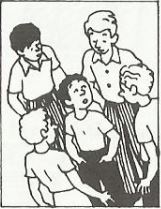
2. a. The young boy is standing among older boys.
b. The young boy is standing between older boys.
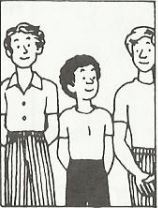
3. a. The young boy is running across the street.
b. The young boy is running along the street.
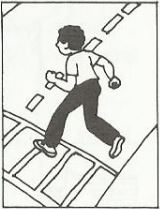
4. a. And now he is running across another street.
b. And now he is running along another street.
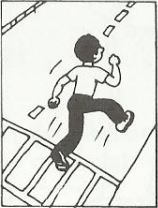
5. a. Now he is going along some railings.
b. Now he is going through some railings.
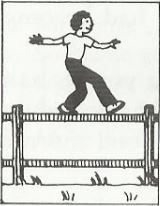
6. a. And now he is going along them.
b. And now he is going through them.

7. a. He is going across a roof.
b. He is going through a roof.
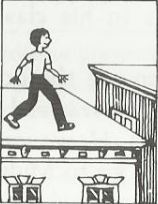
8. a. He is going across a roof.
b. He is going through a roof.
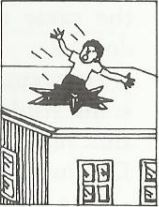
 الاكثر قراءة في Intermediate
الاكثر قراءة في Intermediate
 اخر الاخبار
اخر الاخبار
اخبار العتبة العباسية المقدسة


